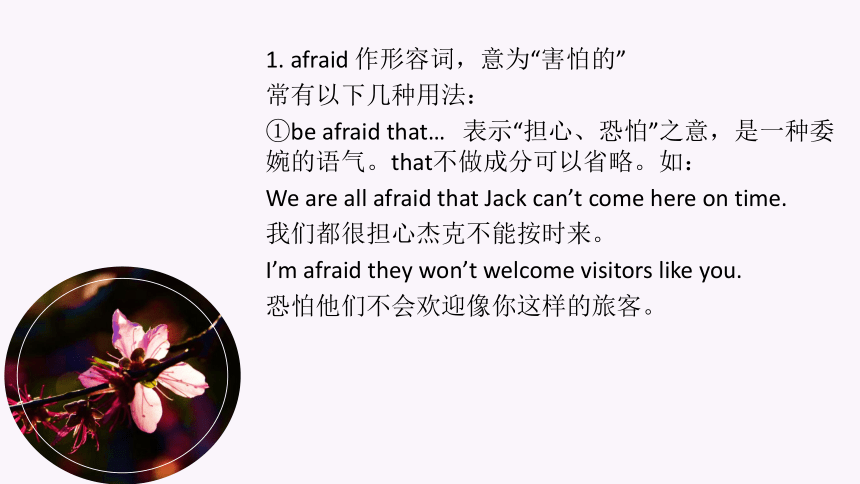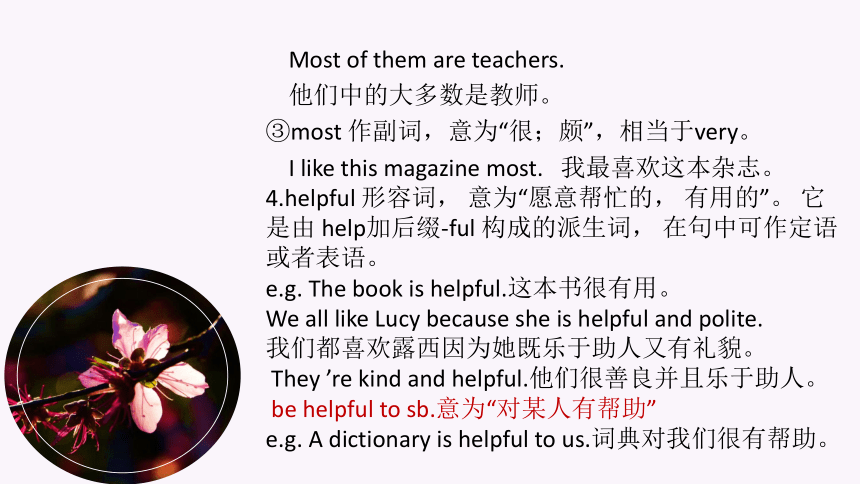牛津译林版英语七年级下Unit 2 Neighbours单元知识点(单词与词组用法)课件(共46张PPT无素材)
文档属性
| 名称 | 牛津译林版英语七年级下Unit 2 Neighbours单元知识点(单词与词组用法)课件(共46张PPT无素材) |

|
|
| 格式 | zip | ||
| 文件大小 | 3.1MB | ||
| 资源类型 | 教案 | ||
| 版本资源 | 牛津译林版 | ||
| 科目 | 英语 | ||
| 更新时间 | 2020-06-28 00:00:00 | ||
图片预览












文档简介
(共46张PPT)
Unit2
Neighbours
单词与词组用法
目录\
Contents
词组用法
单词用法
Part
01
单词用法
1.?afraid?作形容词,意为“害怕的”?
常有以下几种用法:
①be
afraid
that…???表示“担心、恐怕”之意,是一种委婉的语气。that不做成分可以省略。如:?
We
are
all
afraid
that
Jack
can’t
come
here
on
time.
我们都很担心杰克不能按时来。
I’m
afraid
they
won’t
welcome
visitors
like
you.???
恐怕他们不会欢迎像你这样的旅客。
②be
afraid
of
sth/doing
sth??表示“怕……;担心……”。如:
????The
little
girl
is
afraid
of
going
out
at
night.???
????这个小姑娘害怕在夜间外出。
③be
afraid
to
do
sth?表示“怕……”之意。如:?
????Isn’t
he
afraid
to
die??难道他不怕死吗?
2.
waiter
服务员
waiter
可数名词,
意为“服务员”,
其复数形式为
waiters,
一般指男性服务员。
e.g.
My
cousin
works
in
a
hotel
as
a
waiter.
我表哥在酒店里做服务员。
There
are
twenty
waiters
in
the
restaurant.
这家餐厅有
20
个服务员。
waitress
可数名词,
意为“女服务员”。
e.g.
My
sister
wants
to
be
a
waitress.
我的姐姐想当一名服务员。
3.most?
Most
of
them
have
14
floors.???它们大多数有14层。?
①most?作形容词,意为“大多数,在部分”,修饰名词。如:?
????Most
students
are
good
at
Chinese.???
????大多数学生擅长汉语。
②most?作代词,意为“大多数,大部分”,此时可以和of搭配。但most
of?后面若跟名词,名词前需要定冠词、指示代词或物主代词修饰;most
of?后若跟代词,应该跟宾格。如:?
????Most
of
the
people
singing
are
women.???
????唱歌的人之中,大部分是妇女。
????Most
of
them
are
teachers.???
????他们中的大多数是教师。
③most?作副词,意为“很;颇”,相当于very。?
????I
like
this
magazine
most.???我最喜欢这本杂志。
4.helpful
形容词,
意为“愿意帮忙的,
有用的”。
它是由
help加后缀-ful
构成的派生词,
在句中可作定语或者表语。
e.g.
The
book
is
helpful.这本书很有用。
We
all
like
Lucy
because
she
is
helpful
and
polite.
我们都喜欢露西因为她既乐于助人又有礼貌。
They
’re
kind
and
helpful.他们很善良并且乐于助人。
be
helpful
to
sb.意为“对某人有帮助”
e.g.
A
dictionary
is
helpful
to
us.词典对我们很有帮助。
5.
community
可数名词,
意为“社区,
社团”They
often
meet
at
the
community
centre.
他们经常在社区中心集中。
此处名词作定语。
community
作主语时,
谓语动词可用单数或者复数形式。
e.g.
Our
community
is
very
large.我们的社区很大。
Our
community
are
going
to
visit
the
Great
Wall.
我们社团的人打算去游览长城。
6.Something?的基本意思是“某物,某事”
主要用于肯定句中,要否定句或疑问句中通常用anything。
有时为了表示一种较肯定的意味或提出申请等,something也可用于非肯定句中。
There’s
something
wrong
with
my
computer.????
我的电脑坏了。
注意:something用于主语时,谓语动词用单数形式,其相应的代词也用单数形式;
something有形容词修饰时,定语应后置。如:?
????Something
is
wrong
with
the
TV.??
????这台电视出了毛病了。
????I
have
something
important
to
tell
you.???
????我有些重要的事要告诉你。
????Would
you
like
something
to
eat????
????你想要吃什么东西吗?
Is
there
anything
wrong
with
your
fridge?
你的冰箱有故障码?
anything
不定代词,
意为“任何事”,
用来指代事物,
多用于疑问句和否定句中。
肯定句中用
something.
e.g.
The
panda
is
sick.
He
doesn’t
want
to
eat
anything.
这只熊猫病了,
他不想吃任何东西。
Do
you
need
anything?
你需要什么吗?
7.broken
形容词,
意为“弄坏了的,
伤残的”,
可位于名词前作定语或者连系动词后作表语。
e.g.
How
can
you
mend
a
broken
mirror?
你如何能修补一面破碎的镜子?
My
cousin
Annie’s
bicycle
is
broken.
我表妹安妮的自行车坏了。
The
TV
set
is
broken.
这台电视机坏了。
broken
形容词,
还有“骨折,
零碎的,
不连贯的”之意。
e.g.
His
leg
is
broken.
他的腿骨折了。
He
likes
broken
meat.
他喜欢肉屑。
He
speaks
broken
English.
他说一口蹩脚的英语。
8.anyone
不定代词,
意为“任何人”,
相当于
anybody,
常用于疑问句或否定句中,
肯定句中用
someone
或
somebody。
e.g.
Did
anyone
come?
有人来过吗?
Can
you
find
anyone
to
help
you
with
your
homework?
你能找到人帮你做家庭作业吗?
辨析:
anyone
与
any
one
anyone
用作代词,
只能指人,
意为“任何人,
有人”,
不能与of
短语连用。
any
one
既可以指人,
也可以指物,
意为“任何一个人”
或“任
何一个物”,
强调只限一个,
可以和
of
短语连用,
表示多数之中的任何一个。
9.lucky作形容词,意为“幸运的”,在句中常作定语和表语。
be
lucky
to
do
sth.意为“很幸运做某事”。如:
Zeng
Xiaoxian
feels
lucky
to
live
in
Love
Flats.
曾小贤觉得住在爱情公寓里很幸运。
You’re
lucky
to
have
a
community
centre
like
that,
Simon.???
西蒙,你很幸运能有像这样的社区。??
I
was
lucky
enough
to
meet
Li
Ping
there
.???
我很幸运在那儿遇到李平。
He
is
really
a
lucky
dog.????
他真是个幸运的家伙。
You
are
a
lucky
dog.
你是个幸运儿。
lucky
形容词,
意为“幸运的”,
其反义词为
unlucky,
意为“不幸的”。
①
lucky
的名词形式为
luck,
意为“运气”。
Good
luck
to
you.
祝你好运!
Good
luck!
Best
wishes!???
?祝你好运!
②
lucky
的副词形式为
luckily,
意为“幸运地”。
e.g.
Luckily,
he
is
still
alive.
幸运的是,
他还活着。
Luckily,
Mr
Zhang
is
here
and
cangive
you
a
hand.???
好在张老师在这里,可以帮你一把。?
10.bring
是及物动词,
意为“带来”。
e.g.
Please
bring
your
homework
here
tomorrow.
明天请把你的作业带来。
They
are
going
to
bring
some
water.他们打算带些水。
辨析:
bring
,
take
与
carry
bring
“拿来,
带来”,
指从别处
带到说话处
Bring
your
book
to
school
tomorrow.
明天把你的书带到学校来。
take
“拿去,
带去”,
指把某事
或某物带离说话处
Please
take
this
book
to
Lisa.
请把这本书带给丽萨。
carry
“搬运,
携带”,
无方向性
He’s
carrying
a
box
on
his
back.
他背着一个箱子。
11.fire
此处用作可数名词,
意为“火”。
make
a
fire
是固定搭配,
意为“生火”。
e.g.
We
can
make
a
fire
to
keep
the
room
warm.我们可以生火让房间暖和起来。
He
is
going
to
make
a
fire.
他打算生火。
I’m
going
to
make
a
fire
to
cook
food
in
the
open
air
this
Saturday.
我打算周六在野外生火做饭。
与
fire
有关的短语:
on
fire
着火
light
fire
点火
play
with
fire
玩火
5、better可以用作形容词或副词,它是good,
well的比较级,意为“较好,更好”。如:
They
will
make
you
feel
better!??
他们将使你感觉好些!
????There
must
be
a
better
way
to
do
this.???
????一定有更好的方法做这件事。
????He
can
speak
English
a
lot
better
than
I
can.???
????他讲的英语比我好多了。
????I
think
I
like
the
red
one
better.???
????我想我更喜欢红色的那个
12.group
可数名词,
意为“组,
群”。
e.g.
There
are
five
people
in
my
group.我的小组里有
5
个人。
Tom
and
Lily
are
our
group
members.
汤姆和莉莉是我们的组员。
All
our
group
members
know
a
lot
about
styles
and
colours.
我们所有的小组成员对风格和颜色都知道得很多。
拓展:
①
a
group
of
意为“一组,
一群”,
其后多接可数名词的复数形式。
e.g.
A
group
of
girls
are
playing
games.
一群女孩正在做游戏。
②
in
a
group
意为“成群地”。
e.g.
Some
birds
like
flying
in
a
group.一些鸟喜欢成群地飞。
13.Notice
通知
notice
此处用作可数名词,
意为“布告,
通知”。
e.g.
There
are
some
notices
on
the
blackboard.
黑板上有一些通知。
拓展:
①
notice
作不可数名词,
意为“注意”。
常用短语:
take
no
notice
of
…为“不注意…,不理会…”
.
e.g.
He
always
takes
no
notice
of
others.
他总是不理会别人。
②
notice
作及物动词,
意为“注意,
察觉到”,
其后可接名词,
代词或宾语从句;
接省略
to
的不定式作宾语补足语时表示动作已
经发生过了;
接
v-ing
作宾语补足语时说明动作正在进行。
e.g.
I
noticed
him
get
on
the
bus.
我注意到他上了公交车。
I
noticed
him
entering
the
office.
我注意到他正走进办公室。
14.…
We
join
them
together
with
a
/r/
sound
between
them.
….我们用它们之间的/r/把他们连接一起。between
介词,
意为“在….之间”,
常与
and
构成短语
between
…and…
,意为“在…和…之间”。
e.g.
There
is
a
picture
between
the
door
and
the
window.
在门和窗子之间有一副画。
辨析:
between
与
among
between
一般指“在两者之间”
She
is
sitting
between
Lucy
and
Lily.
她正坐在露西和莉莉之间。
among
指“在三者或三
者
以
上
之中”
He
built
a
house
among
the
trees.
他在树林中建了一座房子
15.sound
此处用作连系动词,
意为“听起来”,
后面常接形容词作表语,
还可以和介词
like
连用,意为“听起来像”。
e.g.
I
think
the
song
My
Heart
Will
Go
On
sounds
great.
我认为《我心依旧》
这首歌听起来很棒。
That
sounds
like
a
good
idea.
那听起来像个好主意。
You
sound
like
your
father
when
you
say
that.
你说这话,
听着跟你父亲一样。
拓展:
sound
还可以作名词,
意为“声音”,
指人所能听到的任何声音。
e.g.
Light
travels
faster
than
sound.
光比声音传播得快。
16.I
want
to
help
sick
people.我想帮助生病的人。
sick
形容词,
意为“生病的,
恶心的”。
e.g.
I
feel
sick.
Where
is
the
bathroom?
我感觉恶心,
卫生间在哪里?
I
want
to
see
my
sick
younger
sister.
我想去看望我生病的弟弟。
17.policeman
警察。
policeman
可数名词,
意为“警察”。
它是由“police+man”
构成的合成名词,
其复数形式为
policemen。
policewoman
是女警察,
其复数形式为
policewomen。
e.g.
He
played
a
policeman
in
a
film.
他在一部电影中,
扮演了一名警察。
There
are
two
policemen
in
the
shop.
店里有两名警察。
拓展:
police
意为“警察,
警方”,
是集体名词,
通常与定冠词the
连用。
常用短语:
call
the
police
报警
police
car
警车
police
station警局
18.postman
邮递员
postman
可数名词,
意为“邮递员”。
它是由“post+man”
构成的合成名词,
其复数形式为
postmen。
e.g.
Postmen
will
be
very
busy,
because
more
and
more
people
shop
online.
邮递员会非常忙,
因为越来越多的人在网上购物。
19.company
公司
company
可数名词,
意为“公司”,
其复数形式为
companies。
e.g.
My
mother
works
in
a
big
company.
我妈妈在一家大公司上班。
I’d
like
to
have
a
company
of
my
own
like
Alibaba
when
I
grow
up.
当我长大的时候,
我想拥有像阿里巴巴那样的公司。
拓展:
company
还可以作不可数名词,
意为“客人,
伙伴,
陪伴”
e.g.
I
am
waiting
for
my
company.
我正在等我的客人。
I
am
glad
of
your
company.有你的陪伴,
我很高兴。
20.elder
是
old
的比较级,
常用在名词前作定语,
意为“年级较长的,
年长的”,
一般指在一个家族中有血缘关系的亲人之间进行比较。
e.g.
The
elder
woman
is
my
grandmother.
年长的这位女士是我的奶奶。
Li
Jiacheng
will
let
his
elder
son
manage
his
company.
李嘉诚将让他的大儿子经营他的公司。
Wendy’s
elder
brother
温迪的哥哥
拓展
:
elder
还可意为“资格老的”
e.g.
Her
grandfather
is
an
elder
worker.
她的爷爷是一位老工人。
辨析:
elder
与
older
elder
兄弟姐妹及子女之间的长幼
定语
older
泛指新旧,
老幼,
年龄大小
定语,
表语
e.g.
My
elder
brother
is
one
year
older
than
I
.
我哥哥比我大一岁。
21.job
名词,
意为“工作”。
他是可数名词,
有单复数形式。
e.g.
She
has
a
job
as
a
teacher
now.
她现在有一份当老师的工作。
He
loves
his
job.
他爱他的工作。
辨析:
job
与
work
job
可数名词
多指具体的某种工作,
有时也指临时性的工作
work
不可数名词
泛指体力或脑力劳动,
工作或职业,
也指抽象意义的工作。
e.g.
The
girl
wants
to
find
a
good
job.
那个女孩想找份好工作。
I
have
a
lot
of
work
to
do.我有许多工作要做。
Part
02
词组用法
1、help
sb
with
sth?意为“帮助某人解决某种困难”,
相当于help
sb
(to)
do
sth。如:
They
help
us
with
all
kinds
of
problems.???
他们帮助我们解决各种各样的问题。?
He
often
helps
me
with
my
maths.
=
He
often
helps
me
to
learn
maths.?他经常帮我学习数学。
help的常见短语:
?①help
sb
with
sth
=意为“帮助某人做某事”。
②can’t/couldn’t
help
doing
sth?意为“禁不住做某事”。如:
????She
can’t
help
crying.她忍不住哭了。
③help
oneself
to
…?意为“随便吃……”。如:
????Help
yourself
to
some
fish,
children.??
????孩子们,随便吃点鱼。
④help
sb
(to)
do
sth?意为“帮助某人做某事”。
????I
often
help
my
mother
to
clean
the
room.???
????我经常帮助我的妈妈打扫房间。
2.most
of
意为“…..中的大多数”,
后面接可数名词复数作主语
时,
谓语动词用复数形式。
可接不可数名词作主语,
此时谓语动词用单数形式。e.g.
Most
of
them
have
14
floors.
它们大多数有
14
层。
Most
of
the
doctors
there
are
from
China.
那里的大多数医生来自中国。
Most
of
the
water
is
clean.
大部分水是干净的。
most
of
后的名词是单数时,
谓语动词也是用单数形式。
e.g.
Most
of
the
earth
is
covered
with
water.
地球的大部分被水覆盖。
3.wait
for
意为“等待,
等候”,
其后课接名词,
代词作宾语,
还可以接动词不定式作宾语补足语,
即
wait
for
sb.
to
do
sth.“等候某人做某事”。
e.g.
I
often
wait
for
Tom
at
the
school
gate.
我经常在校门口等汤姆。
Will
you
wait
for
us
to
call
back?你会等我们回电话吗?
We
are
waiting
for
my
father
to
have
dinner.
我们在等我父亲来吃晚饭。
Will
you
wait
for
me
to
go
together?
你会等我一起走吗?
4.
the
day
after
tomorrow
意为“后天”,
常与一般将来时连用。
e.g.
I
am
going
to
visit
my
grandma
the
day
after
tomorrow.
我打算后天去看望我奶奶。
You
will
know
the
results
the
day
after
tomorrow.
你后天就会知道结果了。
My
parents
and
I
are
planning
a
day
out
with
my
uncle’s
family
the
day
after
tomorrow.
我和我的父母打算后天和我叔叔一家外出一天。
拓展:
按照时间顺序排列的时间状语:
the
day
before
yesterday前天→
yesterday
昨天→
today
今天
→tomorrow
明天→the
day
after
tomorrow
后天
5.
feel
well
指“身体感觉舒服,
没有毛病”。
这里
well
是形容词,意为“身体好的,
健康的”。
well
形容词
用于连系动词后,
指身体好副词
在句中修饰动词
good
形容词
在连系动词后作表语或在名词前作定语,
常用来描述人或物的内在品质。
e.g.
If
you
don’t
feel
well,
you
may
see
the
doctor.
如果你感觉不舒服,
你可以看医生。
Are
you
not
feeling
well
these
days?
你最近感觉不舒服吗?
辨析:
well
与
good
e.g.
I
hope
everyone
is
well.
我希望大家都身体健康。(作形容词)
My
father
plays
volleyball
very
well.
我父亲排球打得很好。(作副词)
The
book
is
very
good.这本书相当好。(作形容词)
Everyone
thinks
it’s
a
good
book.
大家都认为这是本好书。(作定语)
6.as
if
意为“似乎,
好像”,
其后接表示虚拟语气的从句(从句谓语动词用过去式,
be
用
were)。
常表示与现在事实相反的情况。
e.g.
He
talks
as
if
he
knew
all
about
it.
他说话的语气好像他什么都知道似的。
She
looks
as
if
she
were
poor.
他看起来像很穷的样子。(其实不穷)
…we
join
them
as
if
there
were
a
/j/
or
/w/
sound
betweenthem.…
我们把它们连接起来,
就好像它们之间有个
/j/
音或
/w/音。
7.office
worker
办公室职员
office
worker
意为“办公室职员,
上班族”
e.g.
My
elder
sister
is
an
office
worker.我姐姐是上班族。
They
are
office
workers.他们是办公室职员。
Thank
you!
Unit2
Neighbours
单词与词组用法
目录\
Contents
词组用法
单词用法
Part
01
单词用法
1.?afraid?作形容词,意为“害怕的”?
常有以下几种用法:
①be
afraid
that…???表示“担心、恐怕”之意,是一种委婉的语气。that不做成分可以省略。如:?
We
are
all
afraid
that
Jack
can’t
come
here
on
time.
我们都很担心杰克不能按时来。
I’m
afraid
they
won’t
welcome
visitors
like
you.???
恐怕他们不会欢迎像你这样的旅客。
②be
afraid
of
sth/doing
sth??表示“怕……;担心……”。如:
????The
little
girl
is
afraid
of
going
out
at
night.???
????这个小姑娘害怕在夜间外出。
③be
afraid
to
do
sth?表示“怕……”之意。如:?
????Isn’t
he
afraid
to
die??难道他不怕死吗?
2.
waiter
服务员
waiter
可数名词,
意为“服务员”,
其复数形式为
waiters,
一般指男性服务员。
e.g.
My
cousin
works
in
a
hotel
as
a
waiter.
我表哥在酒店里做服务员。
There
are
twenty
waiters
in
the
restaurant.
这家餐厅有
20
个服务员。
waitress
可数名词,
意为“女服务员”。
e.g.
My
sister
wants
to
be
a
waitress.
我的姐姐想当一名服务员。
3.most?
Most
of
them
have
14
floors.???它们大多数有14层。?
①most?作形容词,意为“大多数,在部分”,修饰名词。如:?
????Most
students
are
good
at
Chinese.???
????大多数学生擅长汉语。
②most?作代词,意为“大多数,大部分”,此时可以和of搭配。但most
of?后面若跟名词,名词前需要定冠词、指示代词或物主代词修饰;most
of?后若跟代词,应该跟宾格。如:?
????Most
of
the
people
singing
are
women.???
????唱歌的人之中,大部分是妇女。
????Most
of
them
are
teachers.???
????他们中的大多数是教师。
③most?作副词,意为“很;颇”,相当于very。?
????I
like
this
magazine
most.???我最喜欢这本杂志。
4.helpful
形容词,
意为“愿意帮忙的,
有用的”。
它是由
help加后缀-ful
构成的派生词,
在句中可作定语或者表语。
e.g.
The
book
is
helpful.这本书很有用。
We
all
like
Lucy
because
she
is
helpful
and
polite.
我们都喜欢露西因为她既乐于助人又有礼貌。
They
’re
kind
and
helpful.他们很善良并且乐于助人。
be
helpful
to
sb.意为“对某人有帮助”
e.g.
A
dictionary
is
helpful
to
us.词典对我们很有帮助。
5.
community
可数名词,
意为“社区,
社团”They
often
meet
at
the
community
centre.
他们经常在社区中心集中。
此处名词作定语。
community
作主语时,
谓语动词可用单数或者复数形式。
e.g.
Our
community
is
very
large.我们的社区很大。
Our
community
are
going
to
visit
the
Great
Wall.
我们社团的人打算去游览长城。
6.Something?的基本意思是“某物,某事”
主要用于肯定句中,要否定句或疑问句中通常用anything。
有时为了表示一种较肯定的意味或提出申请等,something也可用于非肯定句中。
There’s
something
wrong
with
my
computer.????
我的电脑坏了。
注意:something用于主语时,谓语动词用单数形式,其相应的代词也用单数形式;
something有形容词修饰时,定语应后置。如:?
????Something
is
wrong
with
the
TV.??
????这台电视出了毛病了。
????I
have
something
important
to
tell
you.???
????我有些重要的事要告诉你。
????Would
you
like
something
to
eat????
????你想要吃什么东西吗?
Is
there
anything
wrong
with
your
fridge?
你的冰箱有故障码?
anything
不定代词,
意为“任何事”,
用来指代事物,
多用于疑问句和否定句中。
肯定句中用
something.
e.g.
The
panda
is
sick.
He
doesn’t
want
to
eat
anything.
这只熊猫病了,
他不想吃任何东西。
Do
you
need
anything?
你需要什么吗?
7.broken
形容词,
意为“弄坏了的,
伤残的”,
可位于名词前作定语或者连系动词后作表语。
e.g.
How
can
you
mend
a
broken
mirror?
你如何能修补一面破碎的镜子?
My
cousin
Annie’s
bicycle
is
broken.
我表妹安妮的自行车坏了。
The
TV
set
is
broken.
这台电视机坏了。
broken
形容词,
还有“骨折,
零碎的,
不连贯的”之意。
e.g.
His
leg
is
broken.
他的腿骨折了。
He
likes
broken
meat.
他喜欢肉屑。
He
speaks
broken
English.
他说一口蹩脚的英语。
8.anyone
不定代词,
意为“任何人”,
相当于
anybody,
常用于疑问句或否定句中,
肯定句中用
someone
或
somebody。
e.g.
Did
anyone
come?
有人来过吗?
Can
you
find
anyone
to
help
you
with
your
homework?
你能找到人帮你做家庭作业吗?
辨析:
anyone
与
any
one
anyone
用作代词,
只能指人,
意为“任何人,
有人”,
不能与of
短语连用。
any
one
既可以指人,
也可以指物,
意为“任何一个人”
或“任
何一个物”,
强调只限一个,
可以和
of
短语连用,
表示多数之中的任何一个。
9.lucky作形容词,意为“幸运的”,在句中常作定语和表语。
be
lucky
to
do
sth.意为“很幸运做某事”。如:
Zeng
Xiaoxian
feels
lucky
to
live
in
Love
Flats.
曾小贤觉得住在爱情公寓里很幸运。
You’re
lucky
to
have
a
community
centre
like
that,
Simon.???
西蒙,你很幸运能有像这样的社区。??
I
was
lucky
enough
to
meet
Li
Ping
there
.???
我很幸运在那儿遇到李平。
He
is
really
a
lucky
dog.????
他真是个幸运的家伙。
You
are
a
lucky
dog.
你是个幸运儿。
lucky
形容词,
意为“幸运的”,
其反义词为
unlucky,
意为“不幸的”。
①
lucky
的名词形式为
luck,
意为“运气”。
Good
luck
to
you.
祝你好运!
Good
luck!
Best
wishes!???
?祝你好运!
②
lucky
的副词形式为
luckily,
意为“幸运地”。
e.g.
Luckily,
he
is
still
alive.
幸运的是,
他还活着。
Luckily,
Mr
Zhang
is
here
and
cangive
you
a
hand.???
好在张老师在这里,可以帮你一把。?
10.bring
是及物动词,
意为“带来”。
e.g.
Please
bring
your
homework
here
tomorrow.
明天请把你的作业带来。
They
are
going
to
bring
some
water.他们打算带些水。
辨析:
bring
,
take
与
carry
bring
“拿来,
带来”,
指从别处
带到说话处
Bring
your
book
to
school
tomorrow.
明天把你的书带到学校来。
take
“拿去,
带去”,
指把某事
或某物带离说话处
Please
take
this
book
to
Lisa.
请把这本书带给丽萨。
carry
“搬运,
携带”,
无方向性
He’s
carrying
a
box
on
his
back.
他背着一个箱子。
11.fire
此处用作可数名词,
意为“火”。
make
a
fire
是固定搭配,
意为“生火”。
e.g.
We
can
make
a
fire
to
keep
the
room
warm.我们可以生火让房间暖和起来。
He
is
going
to
make
a
fire.
他打算生火。
I’m
going
to
make
a
fire
to
cook
food
in
the
open
air
this
Saturday.
我打算周六在野外生火做饭。
与
fire
有关的短语:
on
fire
着火
light
fire
点火
play
with
fire
玩火
5、better可以用作形容词或副词,它是good,
well的比较级,意为“较好,更好”。如:
They
will
make
you
feel
better!??
他们将使你感觉好些!
????There
must
be
a
better
way
to
do
this.???
????一定有更好的方法做这件事。
????He
can
speak
English
a
lot
better
than
I
can.???
????他讲的英语比我好多了。
????I
think
I
like
the
red
one
better.???
????我想我更喜欢红色的那个
12.group
可数名词,
意为“组,
群”。
e.g.
There
are
five
people
in
my
group.我的小组里有
5
个人。
Tom
and
Lily
are
our
group
members.
汤姆和莉莉是我们的组员。
All
our
group
members
know
a
lot
about
styles
and
colours.
我们所有的小组成员对风格和颜色都知道得很多。
拓展:
①
a
group
of
意为“一组,
一群”,
其后多接可数名词的复数形式。
e.g.
A
group
of
girls
are
playing
games.
一群女孩正在做游戏。
②
in
a
group
意为“成群地”。
e.g.
Some
birds
like
flying
in
a
group.一些鸟喜欢成群地飞。
13.Notice
通知
notice
此处用作可数名词,
意为“布告,
通知”。
e.g.
There
are
some
notices
on
the
blackboard.
黑板上有一些通知。
拓展:
①
notice
作不可数名词,
意为“注意”。
常用短语:
take
no
notice
of
…为“不注意…,不理会…”
.
e.g.
He
always
takes
no
notice
of
others.
他总是不理会别人。
②
notice
作及物动词,
意为“注意,
察觉到”,
其后可接名词,
代词或宾语从句;
接省略
to
的不定式作宾语补足语时表示动作已
经发生过了;
接
v-ing
作宾语补足语时说明动作正在进行。
e.g.
I
noticed
him
get
on
the
bus.
我注意到他上了公交车。
I
noticed
him
entering
the
office.
我注意到他正走进办公室。
14.…
We
join
them
together
with
a
/r/
sound
between
them.
….我们用它们之间的/r/把他们连接一起。between
介词,
意为“在….之间”,
常与
and
构成短语
between
…and…
,意为“在…和…之间”。
e.g.
There
is
a
picture
between
the
door
and
the
window.
在门和窗子之间有一副画。
辨析:
between
与
among
between
一般指“在两者之间”
She
is
sitting
between
Lucy
and
Lily.
她正坐在露西和莉莉之间。
among
指“在三者或三
者
以
上
之中”
He
built
a
house
among
the
trees.
他在树林中建了一座房子
15.sound
此处用作连系动词,
意为“听起来”,
后面常接形容词作表语,
还可以和介词
like
连用,意为“听起来像”。
e.g.
I
think
the
song
My
Heart
Will
Go
On
sounds
great.
我认为《我心依旧》
这首歌听起来很棒。
That
sounds
like
a
good
idea.
那听起来像个好主意。
You
sound
like
your
father
when
you
say
that.
你说这话,
听着跟你父亲一样。
拓展:
sound
还可以作名词,
意为“声音”,
指人所能听到的任何声音。
e.g.
Light
travels
faster
than
sound.
光比声音传播得快。
16.I
want
to
help
sick
people.我想帮助生病的人。
sick
形容词,
意为“生病的,
恶心的”。
e.g.
I
feel
sick.
Where
is
the
bathroom?
我感觉恶心,
卫生间在哪里?
I
want
to
see
my
sick
younger
sister.
我想去看望我生病的弟弟。
17.policeman
警察。
policeman
可数名词,
意为“警察”。
它是由“police+man”
构成的合成名词,
其复数形式为
policemen。
policewoman
是女警察,
其复数形式为
policewomen。
e.g.
He
played
a
policeman
in
a
film.
他在一部电影中,
扮演了一名警察。
There
are
two
policemen
in
the
shop.
店里有两名警察。
拓展:
police
意为“警察,
警方”,
是集体名词,
通常与定冠词the
连用。
常用短语:
call
the
police
报警
police
car
警车
police
station警局
18.postman
邮递员
postman
可数名词,
意为“邮递员”。
它是由“post+man”
构成的合成名词,
其复数形式为
postmen。
e.g.
Postmen
will
be
very
busy,
because
more
and
more
people
shop
online.
邮递员会非常忙,
因为越来越多的人在网上购物。
19.company
公司
company
可数名词,
意为“公司”,
其复数形式为
companies。
e.g.
My
mother
works
in
a
big
company.
我妈妈在一家大公司上班。
I’d
like
to
have
a
company
of
my
own
like
Alibaba
when
I
grow
up.
当我长大的时候,
我想拥有像阿里巴巴那样的公司。
拓展:
company
还可以作不可数名词,
意为“客人,
伙伴,
陪伴”
e.g.
I
am
waiting
for
my
company.
我正在等我的客人。
I
am
glad
of
your
company.有你的陪伴,
我很高兴。
20.elder
是
old
的比较级,
常用在名词前作定语,
意为“年级较长的,
年长的”,
一般指在一个家族中有血缘关系的亲人之间进行比较。
e.g.
The
elder
woman
is
my
grandmother.
年长的这位女士是我的奶奶。
Li
Jiacheng
will
let
his
elder
son
manage
his
company.
李嘉诚将让他的大儿子经营他的公司。
Wendy’s
elder
brother
温迪的哥哥
拓展
:
elder
还可意为“资格老的”
e.g.
Her
grandfather
is
an
elder
worker.
她的爷爷是一位老工人。
辨析:
elder
与
older
elder
兄弟姐妹及子女之间的长幼
定语
older
泛指新旧,
老幼,
年龄大小
定语,
表语
e.g.
My
elder
brother
is
one
year
older
than
I
.
我哥哥比我大一岁。
21.job
名词,
意为“工作”。
他是可数名词,
有单复数形式。
e.g.
She
has
a
job
as
a
teacher
now.
她现在有一份当老师的工作。
He
loves
his
job.
他爱他的工作。
辨析:
job
与
work
job
可数名词
多指具体的某种工作,
有时也指临时性的工作
work
不可数名词
泛指体力或脑力劳动,
工作或职业,
也指抽象意义的工作。
e.g.
The
girl
wants
to
find
a
good
job.
那个女孩想找份好工作。
I
have
a
lot
of
work
to
do.我有许多工作要做。
Part
02
词组用法
1、help
sb
with
sth?意为“帮助某人解决某种困难”,
相当于help
sb
(to)
do
sth。如:
They
help
us
with
all
kinds
of
problems.???
他们帮助我们解决各种各样的问题。?
He
often
helps
me
with
my
maths.
=
He
often
helps
me
to
learn
maths.?他经常帮我学习数学。
help的常见短语:
?①help
sb
with
sth
=意为“帮助某人做某事”。
②can’t/couldn’t
help
doing
sth?意为“禁不住做某事”。如:
????She
can’t
help
crying.她忍不住哭了。
③help
oneself
to
…?意为“随便吃……”。如:
????Help
yourself
to
some
fish,
children.??
????孩子们,随便吃点鱼。
④help
sb
(to)
do
sth?意为“帮助某人做某事”。
????I
often
help
my
mother
to
clean
the
room.???
????我经常帮助我的妈妈打扫房间。
2.most
of
意为“…..中的大多数”,
后面接可数名词复数作主语
时,
谓语动词用复数形式。
可接不可数名词作主语,
此时谓语动词用单数形式。e.g.
Most
of
them
have
14
floors.
它们大多数有
14
层。
Most
of
the
doctors
there
are
from
China.
那里的大多数医生来自中国。
Most
of
the
water
is
clean.
大部分水是干净的。
most
of
后的名词是单数时,
谓语动词也是用单数形式。
e.g.
Most
of
the
earth
is
covered
with
water.
地球的大部分被水覆盖。
3.wait
for
意为“等待,
等候”,
其后课接名词,
代词作宾语,
还可以接动词不定式作宾语补足语,
即
wait
for
sb.
to
do
sth.“等候某人做某事”。
e.g.
I
often
wait
for
Tom
at
the
school
gate.
我经常在校门口等汤姆。
Will
you
wait
for
us
to
call
back?你会等我们回电话吗?
We
are
waiting
for
my
father
to
have
dinner.
我们在等我父亲来吃晚饭。
Will
you
wait
for
me
to
go
together?
你会等我一起走吗?
4.
the
day
after
tomorrow
意为“后天”,
常与一般将来时连用。
e.g.
I
am
going
to
visit
my
grandma
the
day
after
tomorrow.
我打算后天去看望我奶奶。
You
will
know
the
results
the
day
after
tomorrow.
你后天就会知道结果了。
My
parents
and
I
are
planning
a
day
out
with
my
uncle’s
family
the
day
after
tomorrow.
我和我的父母打算后天和我叔叔一家外出一天。
拓展:
按照时间顺序排列的时间状语:
the
day
before
yesterday前天→
yesterday
昨天→
today
今天
→tomorrow
明天→the
day
after
tomorrow
后天
5.
feel
well
指“身体感觉舒服,
没有毛病”。
这里
well
是形容词,意为“身体好的,
健康的”。
well
形容词
用于连系动词后,
指身体好副词
在句中修饰动词
good
形容词
在连系动词后作表语或在名词前作定语,
常用来描述人或物的内在品质。
e.g.
If
you
don’t
feel
well,
you
may
see
the
doctor.
如果你感觉不舒服,
你可以看医生。
Are
you
not
feeling
well
these
days?
你最近感觉不舒服吗?
辨析:
well
与
good
e.g.
I
hope
everyone
is
well.
我希望大家都身体健康。(作形容词)
My
father
plays
volleyball
very
well.
我父亲排球打得很好。(作副词)
The
book
is
very
good.这本书相当好。(作形容词)
Everyone
thinks
it’s
a
good
book.
大家都认为这是本好书。(作定语)
6.as
if
意为“似乎,
好像”,
其后接表示虚拟语气的从句(从句谓语动词用过去式,
be
用
were)。
常表示与现在事实相反的情况。
e.g.
He
talks
as
if
he
knew
all
about
it.
他说话的语气好像他什么都知道似的。
She
looks
as
if
she
were
poor.
他看起来像很穷的样子。(其实不穷)
…we
join
them
as
if
there
were
a
/j/
or
/w/
sound
betweenthem.…
我们把它们连接起来,
就好像它们之间有个
/j/
音或
/w/音。
7.office
worker
办公室职员
office
worker
意为“办公室职员,
上班族”
e.g.
My
elder
sister
is
an
office
worker.我姐姐是上班族。
They
are
office
workers.他们是办公室职员。
Thank
you!
